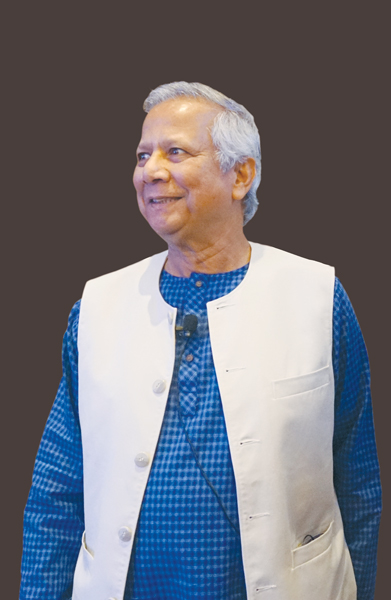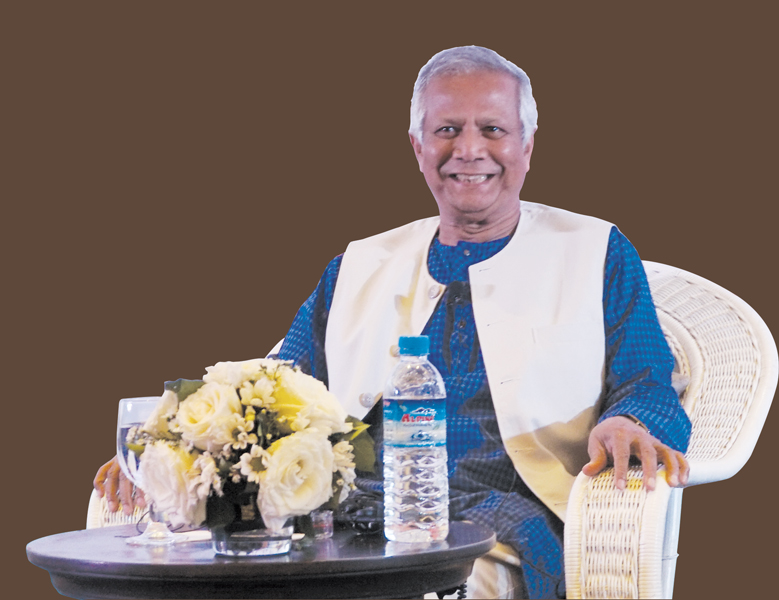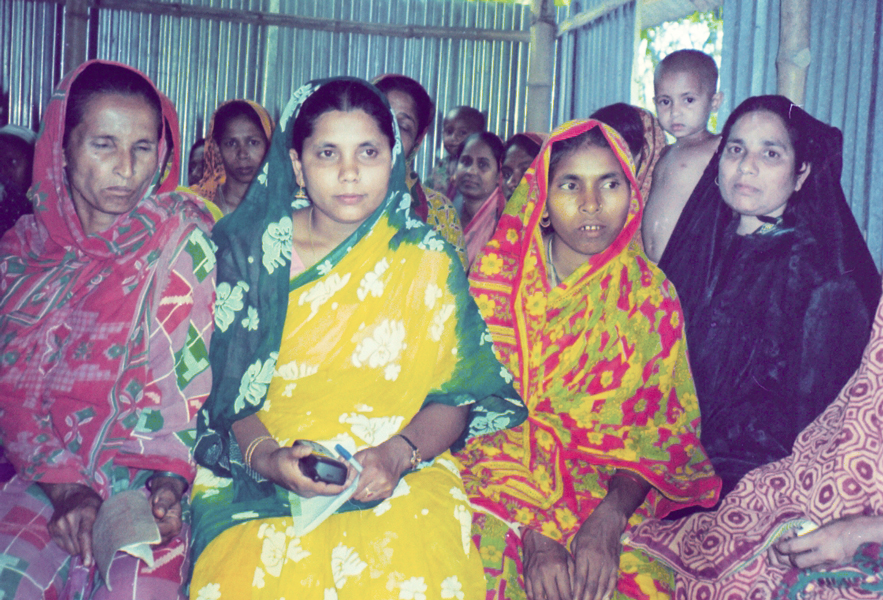Why not women?
Consider this fact.
In 2014, the Grameen Bank of Bangladesh that gives out tiny loans or microfinance to poor women to start small ventures disbursed $1.5 billion. What is remarkable about this figure is that this was the first year when the total deposit of the borrowers alone exceeded $1.5 billion!
“So I tell my friends in the Grameen Bank: ‘Look, it is about time you stop calling them borrowers because the actual borrower is you; you’ve taken more money from them than you have given them. So the tables have turned,” said Prof Muhammad Yunus, founder of the Grameen Bank and Chairman of the Yunus Centre, Bangladesh, an initiative in social business.
He was addressing a special session on Gender and the Media at the World Congress of the International Press Institute (IPI) held in Myanmar last month.
Women coming for bank loans are invariably asked by bankers: Does your husband know? Does he approve?
There were two key takeaways from this startling disclosure. The first — if you can put something in a structure, even tiny money becomes big money. Yunus recalled how in the initial years of Grameen’s formation in the 1970s, women ran away from accepting money but were gradually brought on board.
The next step was to encourage them to save; those who borrowed had to save as everybody was given a savings bank account. In the beginning, it was extremely difficult to convince them to save; “we said don’t worry about how much … put even a few pennies, the important thing is to put something away.”
The woman is reluctant to take money because she is covered with layers and layers of fear. We have to peel off this fear layer by layer.
‘No’ to foreign donations
Soon this became Grameen Bank’s culture. Yunus explained how in the beginning Grameen took international donations “not because we wanted them as we lent only in local currency, the Taka, but the Government needed foreign exchange earnings and we were under tremendous pressure.” But in 1995 he put a halt to foreign donations because “people were accusing Grameen Bank of succeeding because it was getting so much money from outside. So we stopped … many donors were unhappy because the money was in the pipeline.” But the Bank had become big by now and capable of functioning with depositors’ money.
And then last year the deposits of the ‘borrowers’ who actually own Grameen Bank, exceeded $1.5 billion!
Again an interesting story behind this surge in the accounts of its 8.5 million borrowers:
Among the 16 decisions Grameen’s women took about their lives and affairs, one pertains to not taking or giving dowry, as most women with daughters had been devastated by the dowry scourge. Another decision was saving for old age.
Pension funds
The question arose on who would take care of these women when they weren’t capable of functioning and their children were not around in the villages to take care of them. So a pension fund was created and over the years the idea of saving for their old age became so exciting to the women — and it made good fiscal sense too — that today though Grameen has 8.5 million borrowers its pension funds exceed this number, as many women have multiple pension accounts!
I asked bankers: Why don’t you change your name to X, Y or Z Men’s Bank; 99 per cent of your borrowers are men!
Initially the model was that each woman puts 100 Taka every week into her pension account and after 10 years the bank matches her contribution. Yunus said the interest at 12 per cent is a little more than the normal 10 per cent they give their depositors, “but we said it is okay to give a little more for their old age security.” This scheme has become so attractive for them that after two years they come and say we should have put 200 Taka a week, and ask if they can go back and top it up. So we say you can’t do that but you can open another account.” After 10 years they can either take out the money or put it into a monthly income account.
‘Bring your husband’
Yunus recalled that his whole fight with the bankers had started with him arguing that they only lent money to those with lots of money, and to men. “So they said, ‘but women don’t come to us with business proposals.’ ” This, he challenged them, was a lie, and proved to them that when a woman comes with a business proposal, the bankers invariably sift through the pages and ask: ‘Have you discussed this with your husband?’ When the woman says yes, the next question: Does he approve? Finally the woman is dismissed with: “Why don’t you bring him along next week, so we can talk about it?”
The number of pension funds exceeds the 8.5 million borrowers of Grameen Bank as many women have multiple accounts.
“So I asked the bankers that has it ever happened in the history of Bangladesh banking that a man has brought his proposal and you have asked him if you have discussed it with your wife, or bring her along for further discussion. I told them that starting from there you have built up the barriers.”
Interestingly, when the Grameen Founder mentioned this at an international conference, a senior woman academician came up to him and said that this happens not only in Bangladesh but also in her country — Switzerland! “She said after this conference I am going to my bank and they will not loan me the money until my husband okays it! Well Geneva is not Bangladesh and today is not 20 years back. But still it is happening.”
Pictures by Rasheeda Bhagat
Telephone ladies of Bangladesh
Grameen Bank Founder Muhammed Yunus recounted the fascinating story of the telephone ladies of Bangladesh. Keen to bring technology into the lives of poor women, in the 1990s when the Bangladesh government was giving out licences for mobile operators, he applied. “Everybody laughed saying the mobile phone is for the rich and you want to give these phones to poor women who have never seen a phone in their lives.” But his plan was to give bank loans to poor women so they could buy a cell phone and start a business by selling airtime in their villages where nobody had a phone, and make money. Yunus got the license and Grameen Phone rolled out in 1997, and “has become such a roaring business. Nobody had any idea that people had such a hunger for calling each other,” he told the IPI conference.
In a few years, Grameen Phone had 400,000 telephone ladies all over Bangladesh doing roaring business. “It was an instant ticket to get out of poverty, and in the process Grameen Phone became the largest telephone company in Bangladesh, which has six telephone operators in the country today and Grameen Phone is the largest with half the market share,” he said.
So what started as a small initiative to bring telephone services to the poor women has become a huge service. The country of 160 million people has 120 million subscribers and the market is still growing, he added.
Another important thing, added Yunus, is that “we educated the poor woman that this is a powerful device which will take your voice to the highest in the land.” The mobile phone is now used as a device to give “voice to the voiceless,” with the women getting on their handsets the home and office numbers of the Prime Minister, the Minister for women’s affairs, their local Parliamentarian, the Police chief and so on.
Next on the horizon is using the mobile phone for medical diagnosis, he added.
Covered in “layers of fear”
Prof Muhammed Yunus presents a fascinating account of the transformation the Grameen Bank has brought into the lives, mentality and confidence levels of poor women of Bangladesh. When he started he wanted to ensure that at least half the borrowers were women. But when his girl students from the Chittagong University spread out to the nearby villages tried to explain to the women “what we were trying to do, every woman they met said: ‘Oh no, I don’t need the money. I don’t know what to do with money.’ Some said, ‘I am afraid of money’ and others said, ‘I can’t handle money, why don’t you give it to my husband; he knows about money.’ ”
There were even times the women as they were being approached by the Grameen volunteers would disappear saying: “They are coming to give us money.”
It was a strange phenomenon; here were the men lining up to get the money and women were running away. And he was asked: ‘Why don’t we lend to men?’ So he told them that when a woman says I don’t need, or can’t handle money, “always remember that this is not her voice. It is the voice of history. Ever since she was born she was told she is not good for anything, grew up to be regarded as someone who doesn’t exist. When she was born she was unwanted, told she had brought misfortune on the family being a girl child. So she is apologetic about her existence. So try to put some confidence in her. She is covered with layers and layers of fear. Our job is to peel off this fear layer by layer.”
He advised his team not to give up and continue to offer credit to women, and see how long it took. Well, it took six years for the bank’s female borrowers’ ratio to come to 50:50. Next, they noticed that case after case the money going to the family through women did a lot more good compared to that going to men. “So we asked what is so good about 50:50 and focused more on women till the ratio became 80 and then 90 and now it is at 97 per cent for a long time.” They found women using their loans carefully, judiciously for the good of the entire family.
Experience told them that women across the world were getting better mileage from the loans they got compared to men. “So over time microcredit became synonymous not only with the poor but with poor women.”
At Grameen Bank’s 10th anniversary in 1986 when a banker’s institute organised a review seminar, there was a lot of criticism this model wouldn’t work. One frequent, and irritating, suggestion was: Why don’t you change the name of your bank to Grameen Women’s Bank. “In 1986 we were just 63 per cent women; so I said I’d be very happy to do so but before that why don’t you change your banks’ names to X, Y or Z Men’s Bank? Because 99 per cent of your borrowers are men.”
Underlining the insensitivity of anybody asking ‘Why women,’ Yunus said, “It makes it appear as though you’ve done something terribly wrong.”




